

State of the World’s Forests – collection 1995–2005. 2005. Rome, FAO. ISBN 92-5-005288-X. CD-ROM.
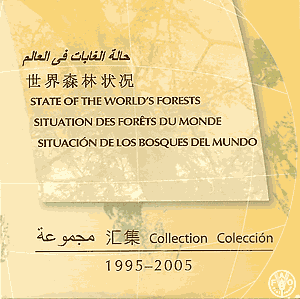
FAO has published State of the World’s Forests – the Organization’s flagship publication presenting the latest information on major policy and institutional developments and key issues concerning the forest sector – every other year since 1995.
In coordination with the publication of State of the World’s Forests 2005 (see p. 10), FAO has released a CD-ROM containing the entire collection of the report since its first edition. It contains all six issues of the publication in Arabic, Chinese, English, French and Spanish. This unique resource provides a ready overview of the situation and development of forest resources over the past decade. State of the World’s Forests aims to make reliable and policy-relevant information widely available to facilitate informed discussion and decision-making, and the CD will certainly assist in this objective. Copies can be requested from: [email protected]
In search of excellence: exemplary forest management in Asia and the Pacific. P. Durst, C. Brown, H. Tacio & M. Ishikawa, eds. 2005. Bangkok, Thailand, FAO Regional Office for Asia and the Pacific and Regional Community Forestry Training Center for Asia and the Pacific (RECOFTC). ISBN 974-7946-68-8.
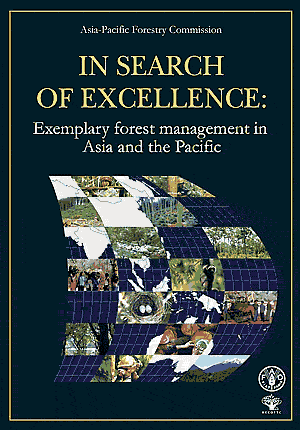
Tales of destruction and gloom often catch the media spotlight, and this tendency is especially apparent in the forest sector. Deforestation, depletion of forest resources and illegal logging grab worldwide headlines, projecting an image of an industry that is blighted by mismanagement and self-interest. However the reality on the ground often contradicts these negative reports, and foresters are increasingly becoming frustrated at the lack of attention given to the many instances of good forest management that they see and experience day to day.
In search of excellence: exemplary forest management in Asia and the Pacific is testimony to the inspiring sustainable forestry that is being practised in the region, and to the desire shared by many to shift the spotlight on to examples of exemplary forest management. Following an international call for nominations of well-managed forests in the region, 28 examples were chosen for the in-depth case studies that are gathered together in this publication. What emerge are individual stories of innovation, endeavour and ingenuity that are leading to successful management of forests in Asia and the Pacific.
This attractive book will inspire and motivate all those who wish to manage forests in a sustainable manner, and will serve as a resource pool of successful policies and management approaches that can be replicated or adapted both in Asia and the Pacific and in other regions.
People and forests – FAO participatory forestry publications. 2004. Rome, FAO. ISBN 92-5-005208-1. CD-ROM.
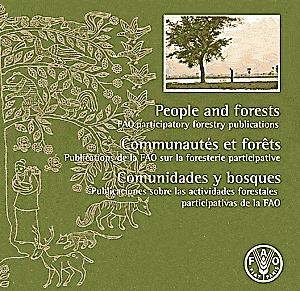
This trilingual CD-ROM contains 15 years of publications produced by FAO and its partners under the Forests, Trees and People Programme (FTPP). FTPP, which started in 1987 and ended in 2002, was an international community forestry programme designed to increase social and economic equity and improve well-being, especially of the poor, through collaborative and sustainable management of trees, forests and other natural resources. The CD-ROM includes more than 70 publications in English, French and Spanish on participatory forestry and related subjects, organized according to series, theme and alphabetical order.
It is hoped that these publications will contribute to strengthening human and institutional capacities that are necessary for the support of locally based sustainable management of forest resources.
Beyond tropical deforestation: from tropical deforestation to forest cover dynamics and forest development. D. Babin, ed. 2004. Paris, France, United Nations Educational, Scientific and Cultural Organization (UNESCO) and International Cooperation Centre of Agricultural Research for Development (CIRAD). ISBN 92-3-103941-5 (UNESCO), 2-87614-577-4 (CIRAD).
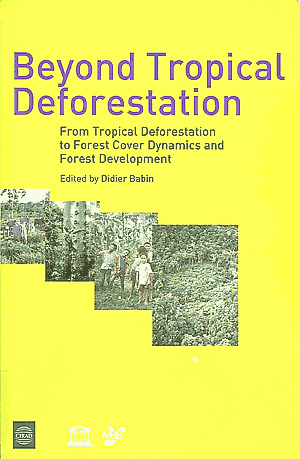
The global trend of deforestation in the world’s tropical forests has caused international concern. The connection between forest depletion and climate change is well documented, as are the detrimental social and economic effects of deforestation. Tropical forests, accounting for more than half the world’s forest cover, are home to a large share of the world’s biodiversity, and the increasing degradation of these resources is raising alarm globally.
However, behind this global trend are individual processes and patterns that vary from one country to another, and the effects of deforestation are not always all negative. Beyond tropical deforestation: from tropical deforestation to forest cover dynamics and forest development takes a fresh look at the issues surrounding deforestation and aims to uncover its myriad causes and consequences. This insightful book is a compilation of essays by scientists and researchers from around the world, drawn from the results of fieldwork and theoretical studies in disciplines spanning the natural and social sciences.
The book is divided into three parts. Part I considers how and why changes in forest area are estimated, and also looks at other ecosystems. Part II examines the impact of human communities on forest dynamics, and the social aspects and conflicts associated with forested areas. Part III analyses forest area dynamics in relation to land use planning and forest development.
The multidisciplinary approach of this book, and the inclusion of concrete examples from Latin America, Asia and Africa, make it a valuable, balanced source of information on tropical deforestation. It will be of interest to all scientists, managers, development agencies and concerned individuals who wish to explore the many aspects of deforestation and to open their minds to the complex issues involved.
Plantations, privatization, poverty and power. M. Garforth & J. Mayers, eds. 2005. London, UK, International Institute for Environment and Development (IIED). ISBN 1-84407-152-9.
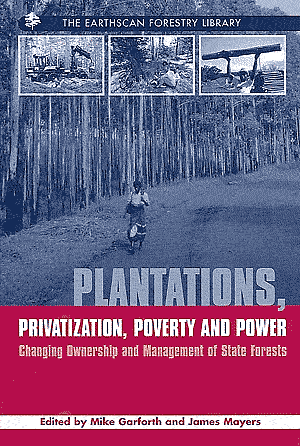
Over the past century, the area of forest plantations has increased from negligible to more than 187 million hectares worldwide, and it continues to increase. Governments have played a significant part in this process, both as plantation developers and managers, and as investment promoters and subsidizers of private-sector plantations. However, plantations are increasingly being transferred into private hands, as governments seek to limit their own involvement in plantation management. The motives behind this move are varied, as are the outcomes both for plantations and the people who depend on them.
Plantations, privatization, poverty and power examines the options for ownership and management of State forest plantations, and how the involvement of the private sector can generate benefits without creating social, economic or environmental losses. The book aims to provide a balanced assessment of the processes and mechanisms involved. The analysis is based on seven country case studies, from Australia, Chile, China, India, New Zealand, South Africa and the United Kingdom. These were originally prepared for the International Conference on Changing Ownership and Management of State Forest Plantations held in Cape Town, South Africa in November 2002, and are reproduced in the second half of the book.
By identifying the opportunities for privatizing plantations and the challenges that such transfer brings, this book offers a guide on how to achieve a balance between public and private involvement in plantations. The book will be of interest to all who are grappling with the issues linked to changing ownership and management not only of forest plantations, but also of natural forests.